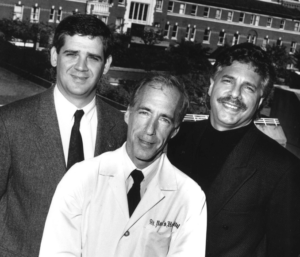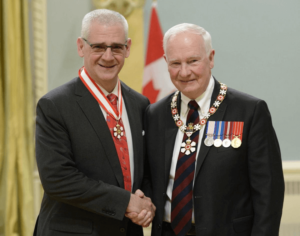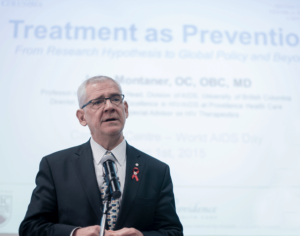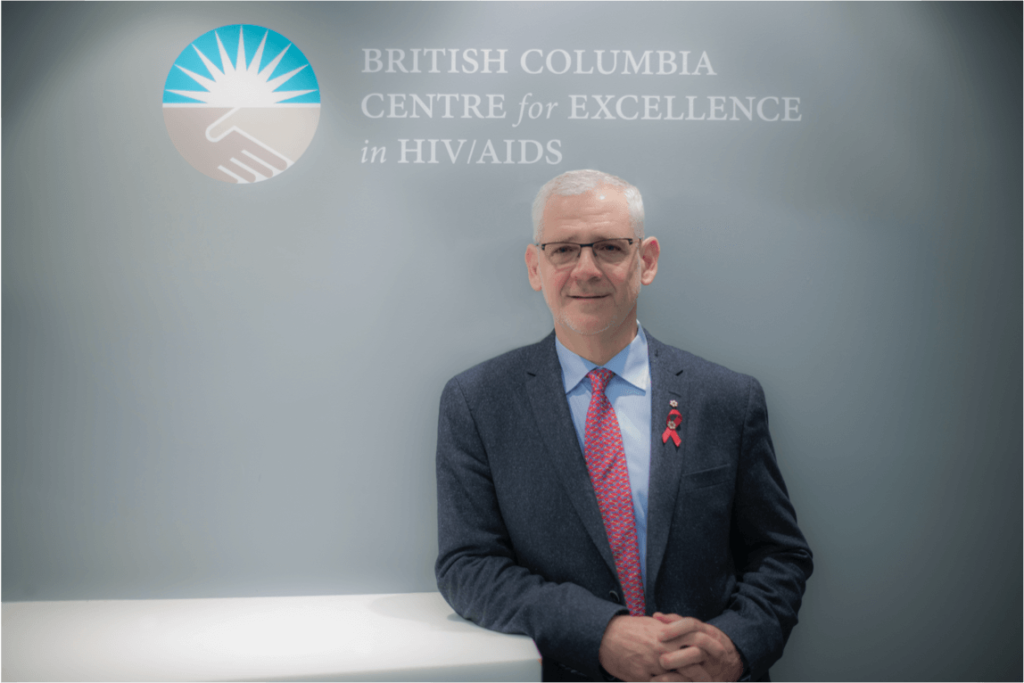A 20-year journey of health research in BC: An award-winning clinician-scientist
16 June 2021

Dr. Julio Montaner. Photo credit: BC Centre for Excellence in HIV/AIDS
Dr. Julio Montaner: The clinician-scientist who showed the world that it could be done
He’s an award-winning, internationally recognized name in the field of HIV/AIDS, known for pioneering the United Nations-endorsed Treatment as Prevention® (TasP®) approach that has significantly curtailed the progression of HIV and made an incredible impact on the lives of Canadians and people around the world. Yet, after four decades in the field, the ever-humble Dr. Julio Montaner still feels like there is more that can be done for HIV/AIDS research. “I want to get this thing fixed before I’m done with my academic and professional life.”
This long-term dedication to and passion for science and patients is a recognized hallmark of clinician-scientists like Julio. The pressures are significant: juggling research to understand fundamental science and maintaining clinical office hours to treat patients, all while mentoring students and managing family time.
“Clinician-scientists are a rare breed,” Julio chuckles. “It’s important to recognize that there are no half measures. You need to go pedal to the metal and be extremely focused.”
“Clinician-scientists are a rare breed,” Julio chuckles. “It’s important to recognize that there are no half measures. You need to go pedal to the metal and be extremely focused.”
In 2010, Julio was the first recipient of the MSFHR Aubrey J. Tingle Prize for his work in improving health outcomes for people living with HIV/AIDS. Since then, the prize has been awarded annually to a British Columbia clinician-scientist whose work in health research is internationally recognized and has had a significant impact on advancing research in their field — as well as the uptake of their evidence — to improve health and the health system in BC, and globally. For Julio, this recognition made this award particularly memorable as it was the first time a funding agency recognized clinician-scientists’ extraordinary commitment to health research and patients.

Growing up in Buenos Aires, Argentina, young Julio was only interested in his father’s work as a physician specializing in tuberculosis treatment. He started medical school, but soon found himself enamoured with the science and the possibilities to make an impact on public health. A chance encounter at a conference with the eminent scientist and chronic obstructive pulmonary disease (COPD) specialist Dr. James Hogg led to Julio coming to Canada in 1981, where he completed a postgraduate fellowship in internal medicine at the University of British Columbia. He then began work at St. Paul’s Hospital, where he saw alarmingly high numbers of young adults with devastating pneumonia-like symptoms, who couldn’t breathe. These cases would eventually be understood to be some of the earliest known cases of AIDS in Canada and advanced Julio’s focus from respiratory research into addressing the emerging HIV/AIDS epidemic.
In the years that followed, Julio led and founded a number of AIDS-focused research programs and projects. In 1996, he played a pivotal role in establishing HAART (highly active antiretroviral therapy), a medication treatment plan for AIDS patients that changed HIV from a formally fatal diagnosis to a chronic, manageable disease. In 2006, Julio presented his groundbreaking made-in-BC concept TasP®, advocating for early access to HIV testing and immediate, sustained access to universal HIV treatment that could improve quality of life and longevity for people living with HIV — while reducing their viral load to a point where the virus could not be transmitted to another person.

TasP® was formally endorsed as the standard of care by the United Nations in 2014 and led Julio to develop the TasP®-inspired ambitious global UNAIDS 90-90-90 target to end AIDS as a global pandemic by 2030. The target called for at least 90% of HIV cases to be diagnosed, at least 90% of individuals diagnosed to have access to HAART and 90% of those on treatment to achieve viral suppression by 2020. Modelling work carried out at the BC Centre for Excellence in HIV/AIDS under Julio’s leadership showed that meeting the 90-90-90 target by 2020 would lead to a 90% decrease in AIDS-related mortality and new HIV infections by 2030. In 2020, British Columbia surpassed the 90-90-90 target, and as a result AIDS-related morbidity and mortality decreased by over 90%, and new HIV infections decreased by over 85%, marking the end of AIDS as an epidemic concern in our province.
Julio’s life work in advocacy, research and medicine to address the HIV/AIDS epidemic has made an incredible impact on the lives of Canadians and people around the world. As a clinician-scientist, he continues to balance the needs of his patients, the research he aims to complete and the program implementation needed to advance the cause. He strongly believes that a key to his success has been his ability to combine a strong patient-oriented focus with a commitment to impact public health in a cost-effective fashion; an approach that he believes should be emulated by hospital-based researchers.


In 2020, British Columbia surpassed the 90-90-90 target, and as a result AIDS-related morbidity and mortality decreased by over 90%, and new HIV infections decreased by over 85%, marking the end of AIDS as an epidemic concern in our province.
“I remember often those who didn’t make it,” he says. “It was a very long tunnel and it was very dark for a very long time. I am proud of the support from our patients, and grateful for their commitment at a time when there was very little hope. We have a shared responsibility to see the end of this epidemic, and our BC Centre for Excellence team and I will continue to do the heavy lifting to honour their memory.”
Aubrey J. Tingle Prize recipients: A distinguished list of clinical researchers
- 2010: Dr. Julio Montaner
- 2011: Dr. Michael Hayden
- 2012: Dr. Bruce McManus
- 2013: Dr. Martin Gleave
- 2014: Dr. Samuel Aparicio
- 2015: Dr. Adeera Levin
- 2016: Dr. Randy Gascoyne
- 2017: Dr. Jim Russell
- 2018: Dr. David Huntsman
- 2019: Dr. Jerilynn C. Prior
- 2020: Dr. Poul Sorensen
Learn more about Julio:
About the Aubrey J. Tingle Prize
Aubrey J. Tingle Prize Presented to Dr. Julio Montaner (MSFHR, June 2010)
Order of BC: Dr. Julio Montaner (2010)
Order of Canada: Dr. Julio Montaner (2014)
Canadian Medical Hall of Fame, Julio S.G. Montaner, MD (2015)
BC Centre for Excellence in HIV/AIDS Team: Dr. Julio Montaner
The 30 30 Campaign: Julio’s Story
Learn more about AIDS research:
BC Centre for Excellence in HIV/AIDS: Treatment as Prevention®
BC First Province to Declare the End of AIDS as an Epidemic (BC Centre for Excellence in HIV/AIDS, December 2019)
The Impact of Treatment as Prevention on the HIV Epidemic in British Columbia, Canada (National Library of Medicine, April 2020)






